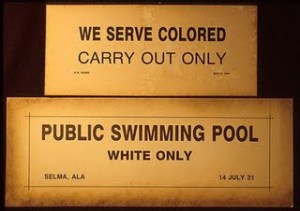NOTE: The following is a reply to a comment on my post, “Another Ayn Rand Nut For Our Times,” by someone with the moniker, “Wants.” Those of you not interested in Ayn Rand or political philosophy should skip the following entry.
Wants,
Thanks for that thoughtful response. And I must say it is refreshing to engage someone who holds the views you do (“I can understand the root of the fear“), yet understands that those who hold a different view are not anti-American or unpatriotic devils. The following is a rather lengthy response, but your comments allow me to do something I have wanted to do for a while: briefly explore the strange world of those conservatives who seem to have an affection for the once-heretical ideas of the little Russian-American philosopher, Ayn Rand.
To begin, let us move away from a discussion of We the Living to the much more familiar, Atlas Shrugged, about which Glenn Beck said on his radio show several months ago:
Ayn Rand understood and identified the deeper causes of the crisis we’re facing, and she offered in “Atlas Shrugged” the principled and practical solution consistent with American values.
 The core idea of Atlas Shrugged is that, in the words of Whittaker Chambers, “the Children of Light win handily by declaring a general strike of brains, of which they have a monopoly, letting the world go, literally, to smash.“
The core idea of Atlas Shrugged is that, in the words of Whittaker Chambers, “the Children of Light win handily by declaring a general strike of brains, of which they have a monopoly, letting the world go, literally, to smash.“
I can’t imagine a more arrogant or elitist conception of life, and it is a weird irony that many of the contemporary proponents of such a view would also see themselves as populists, much like Glenn Beck does. The idea that without these “brains” (those who “get it”) the rest of us will make a mess of the world is a sentiment echoed (sometimes thunderously, sometimes faintly) throughout the world of right-wing talk radio and television.
But no matter the intensity, there exists the notion that those of us on the outside—who are “asleep”—cannot possibly survive without those insightful, productive, clear-eyed egoists leading the way, and it is incumbent upon us to subordinate ourselves, if we wish to have any kind of decent life. And the grand irony is that they present the necessary subordination of ourselves and our ideas to their views in the language of liberty.
Admittedly, this hybrid philosophy is believed only by a relatively small group of people, but many of its propagandists have a rather large megaphone, sometimes influencing professional politicians who call themselves Republicans. And I have often argued that they are doing irreparable harm to the Grand Old Party, like Darwin’s parasitic wasp feeding on its host.
You wrote,
I don’t think there is anything inherently wrong with questioning government expansion, but I also don’t agree that it is inherently an irretrievable step closer to totalitarianism.
Now, that is a sensible view, and one that thoughtful people can discuss.
Your most perceptive statement, though, was:
Most people will agree that some form of government is necessary to protect and guarantee the basic rights of individuals in a society, but when it comes to modifying the power and reach of the government it is perfectly viable to question whether an expansion of power is needed and justified or whether it is over-reaching.
There are always legitimate questions about the propriety of government action. Is the action necessary? Does it increase or at least preserve the reservoir of liberty? A quick example would be federal civil rights laws that effectively ended Jim Crow. Were they an expansion of federal power? Yes. But did they serve to increase the reservoir of liberty? Absolutely. Thus, such laws were not only justified, they were necessary in order to give to culturally disenfranchised black citizens a degree of liberty enjoyed by whites.
 But a sterile, Randian analysis of such laws these days might suggest something different: What about the rights of the restaurant owner who doesn’t want black people eating with whites? What about his rights? And there is the problem: The contraction of the “liberty” of a proprietor—(“You can’t discriminate against a man because he is black“) is understood as an evil. And the expansion of the liberty of multitudes of African-Americans is never considered, certainly not considered as a “good.”
But a sterile, Randian analysis of such laws these days might suggest something different: What about the rights of the restaurant owner who doesn’t want black people eating with whites? What about his rights? And there is the problem: The contraction of the “liberty” of a proprietor—(“You can’t discriminate against a man because he is black“) is understood as an evil. And the expansion of the liberty of multitudes of African-Americans is never considered, certainly not considered as a “good.”
Another discovery, when one mines the rich vein of irony in contemporary (as opposed to the old-line variety represented by William F. Buckley) conservatism’s flirtation with Randian philosophy, is highlighted by Chambers, as he references Karl Marx:
He, too, admired “naked self-interest” (in its time and place), and for much the same reasons as Miss Rand: because, he believed, it cleared away the cobwebs of religion and led to prodigies of industrial and cognate accomplishment. The overlap is not as incongruous as it looks. Atlas Shrugged can be called a novel only by devaluing the term. It is a massive tract for the times. Its story merely serves Miss Rand to get the customers inside the tent, and as a soapbox for delivering her Message. The Message is the thing. It is, in sum, a forthright philosophic materialism.
And there you have it.
In order to attack liberalism, particularly the caricatured liberalism of Barack Obama, contemporary conservatives are willing to put into service a naked materialist like Ayn Rand, if not utilizing the letter of her writings, at least making use of the spirit of them.
 Chambers, a religious man, was naturally dubious of Rand’s atheism, and he portrayed her philosophy as one in which, “Man becomes merely the most consuming of animals, with glut as the condition of his happiness and its replenishment his foremost activity.“
Chambers, a religious man, was naturally dubious of Rand’s atheism, and he portrayed her philosophy as one in which, “Man becomes merely the most consuming of animals, with glut as the condition of his happiness and its replenishment his foremost activity.“
He continues:
Systems of philosophic materialism, so long as they merely circle outside this world’s atmosphere, matter little to most of us. The trouble is that they keep coming down to earth. It is when a system of materialist ideas presumes to give positive answers to real problems of our real life that mischief starts. In an age like ours, in which a highly complex technological society is everywhere in a high state of instability, such answers, however philosophic, translate quickly into political realities. And in the degree to which problems of complexity and instability are most bewildering to masses of men, a temptation sets in to let some species of Big Brother solve and supervise them.
The final irony of the new coalition of conservatism and Randianism is that her “noble” philosophy, predicated on a fierce but false idea of freedom, will inevitably end in a kind of tyranny. Chambers sees in Rand’s call for “productive achievement” a necessarily “technological achievement,” which can only be supervised by “a managerial political bureau.” Such a situation, according to Chambers,
…can only head into a dictatorship, however benign, living and acting beyond good and evil, a law unto itself (as Miss Rand believes it should be), and feeling any restraint on itself as, in practice, criminal, and, in morals, vicious (as Miss Rand clearly feels it to be).
Whittaker Chambers, a former communist, had at least some insight into the totalitarian mind. He wrote of Atlas Shrugged, but really of the Nietzschean Ayn Rand herself:
From almost any page of Atlas Shrugged, a voice can be heard, from painful necessity, commanding: “To a gas chamber — go!” The same inflexibly self-righteous stance results, too (in the total absence of any saving humor), in odd extravagances of inflection and gesture… At first, we try to tell ourselves that these are just lapses, that this mind has, somehow, mislaid the discriminating knack that most of us pray will warn us in time of the difference between what is effective and firm, and what is wildly grotesque and excessive. Soon we suspect something worse. We suspect that this mind finds, precisely in extravagance, some exalting merit; feels a surging release of power and passion precisely in smashing up the house.
I can’t help but admire the voice of Whittaker Chambers, even as I have moved away from that despairing “man of the right,” and even as his voice is increasingly unfamiliar to a new generation of philosophically deaf conservatives.
But there is no denying that he accurately pegged the little Russian woman, who though he thought her sophistic and egoistic philosophy would have no “lasting ill effects,” nevertheless could not countenance her literary supposition, “that the Hippocratic Oath is a kind of curse.”
If you doubt the influence of Ayn Rand on some of those who are leading the New Right, here is a short video of Glenn Beck conversing with Yaron Brook, Executive Director, The Ayn Rand Center:








Anson
/ October 27, 2009Duane,
You and “wants” have me engaged. I am posting a blog on Ayn Rand, momentarily.
Anson
LikeLike
Jim Hight
/ October 29, 2009Alexander Hamilton and many other Federalists believed that a class of leaders was ncecessary for the survival of the country. These leaders would be the elite, receiving the best education and employment. The same is being said by the extreme right.
LikeLike
ansonburlingame
/ October 29, 2009Jim,
So did Plato. Pick beneath the surface and Jefferson and many, almost all of the Founders probably did too. Why otherwise would they only allow white, male property owners to vote?
Anson
LikeLike